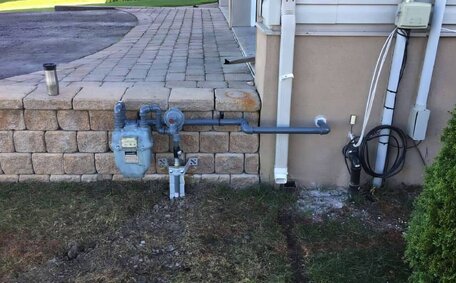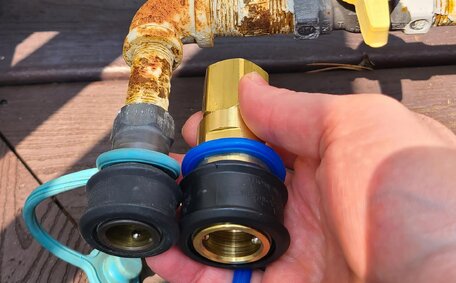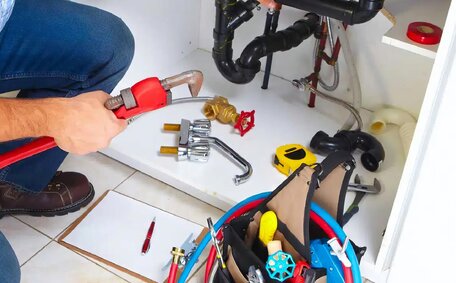Introduction to blocked drains in rental properties
Blocked drains are a common issue in rental properties. Debris, grease, hair, and other materials often accumulate in pipes over time, eventually causing blockages. Determining who is responsible for repairing a blocked drain, whether tenant or landlord, depends on various factors.
It’s important for both tenants and landlords to understand their obligations regarding blocked drains under the tenancy agreement and local regulations. Establishing responsibilities at the start of a tenancy can prevent future disputes over plumbing issues.
This article provides a comprehensive guide on managing blocked drains, pinpointing common causes in rentals, and delineating tenant and landlord responsibilities. We’ll define the responsibilities of both tenants and landlords, emphasise preventative measures, and offer guidance on resolving drain blockages effectively. Understanding the division of responsibility is key to quickly restoring proper drainage and avoiding health hazards.
Defining the responsibilities around plumbing maintenance
In New South Wales, property owners are responsible for maintaining rental properties in proper working condition, as per the Residential Tenancies Act. This includes ensuring that plumbing and drainage systems and fixtures like drains, taps, and toilets remain functional.
Specifically, on your property, landlords must:
- Make sure the property is clean, in good repair, and fit to live in at the start of the tenancy
- Respond promptly to maintenance requests and conduct the necessary repairs as reported by the tenant
- Arrange repairs by a licensed plumber when necessary
- Cover the costs of repairs (unless been caused by tenant misuse or negligence)
Tenants must actively participate in ongoing plumbing care, collaborating with landlords to uphold property maintenance. They are expected to:
- Report plumbing issues or blockages as soon as they occur
- Avoid letting grease, hair, and debris go down drain
- Prevent damage due to negligence or inappropriate use
- Gain landlord approval before attempting repairs independently
It is crucial to familiarise yourself with these maintenance responsibilities under NSW tenancy law. It ensures that minor plumbing issues don’t escalate into major problems through neglect. Prompt collaboration ensures swift repairs, thereby preserving the property and living standards.
Common causes of blocked drains
There are several typical culprits behind blocked drains in rental homes:
- Accumulated grease and food scraps in the kitchen sink - Grease solidifies in pipes over time. Food particles also cling to pipes.
- Tree roots - Roots from shrubs or trees planted too close can invade and rupture drains.
- Excess toilet paper - Improper toilet paper usage leads to buildup and clogged pipes.
- Hair - Strands catch in pipes, combining with soap residue to block water flow.
- Dirt and debris - Grit, leaves, toys, and other objects wash down poorly covered drains.
These common issues can affect bathroom sinks, kitchen sinks, floor drains, main sewer lines, and wastewater pipes if neglected. Regular, high-quality maintenance is crucial to prevent blockages, mainly caused by avoidable household habits.
Prompt intervention, sometimes with local council advice, can minimise damage. Unaddressed sink clogs can escalate into major plumbing emergencies. Understanding causes thus allows tenants and landlords to be proactive via good maintenance habits and swift response when problems arise.
The tenant’s role in preventing and addressing blockages
Tenants would use their understanding of maintaining clear pipes to play a crucial role in preventing and addressing blocked drains. Simple, consistent habits can stop many issues before they start:
- Consult plumbers before disposing of fats, oils, and food scraps down sinks or toilets
- Install drain covers and hair catchers in baths and sinks
- Use drain maintenance products monthly to clear grease and debris
- Place trash cans under bathroom sinks to dispose of waste properly
- Check yards for invasive tree roots near drainage pipes
- Ensure items beyond toilet paper and human waste do not go down toilet
If a blockage does occur, tenants should:
- Attempt plunging the drain first with a plunger or drain snake
- Pour hot water or enzyme drain cleaner down the affected pipe
- Inspect the premises to ascertain where blockage might be by checking adjoining sinks, tubs, and toilets
- Notify the landlord promptly if unable to clear the blockage
- Grant the landlord or drain plumber access for inspection and repairs
- File incident reports regarding causes and actions taken
Following these steps allows tenants to proactively maintain plumbing, troubleshoot minor clogs independently, obtain assistance for major blockages, and provide details helping assess liability if damage occurred. Early communication of issues and adherence to lease terms are pivotal.
The landlord’s obligations for repairs and maintenance
Under New South Wales rental laws, landlords are tasked with repair and maintenance duties, including prompt response to blocked drains and the coordination of timely professional repairs.
Specifically, if a tenant notifies the landlord of a blocked drain, the landlord is obligated to:
- Inspect the property within 7 days or make arrangements for diagnosis and service
- Determine if the blockage resulted from misuse or negligence (tenant liability) or standard wear and tear (highlighting the landlord’s responsibility)
- Schedule repairs by a licenced plumber within 14 days for urgent issues impacting habitation or 21 days for standard repairs
- Cover all costs unless caused by tenant damage or disregard of lease terms
- Provide formal documentation regarding the incident, actions taken, and outcomes
For emergency repairs needed to fix dangerous blockages affecting essential services like sewer lines, Landlords must act swiftly upon receiving reports of drainage issues. NSW Fair Trading stipulates Temporary fixes must be enacted promptly, often by the next day and complete resolution within 72 hours.
Fulfilling these repair duties with very professional service keeps plumbing operating safely at rental properties while preventing disputes over liability. When landlords and tenants collaborate to address issues promptly, the causes of blockages can also be better identified and prevented in future.
Navigating emergency plumbing situations
Emergency plumbing situations demand immediate attention to avert threats to health, safety, and property. In emergency situations, landlords and tenants must act quickly to manage blocked pipes.
Emergencies include:
- Burst water pipes flooding a property
- Gas leaks from appliances or pipe joints
- Broken my hot water system resulting in a lack of access to warm water
- Private wastewater system blockages backing up sewage inside
In urgent scenarios, tenants must address blocked drains promptly:
- Stop using all affected plumbing fixtures and utilities
- Contain damage and cleaning up spillages if safe
- Ventilate the property if leaks involve hazardous gases
- Notify the landlord immediately with detailed descriptions
- Grant urgent access for inspection and emergency repairs
Landlords need to address emergency blockages decisively:
- Ensure licensed plumbers promptly assess and temporarily resolve the situation within 24 hours
- Implement repairs meeting safety standards within 72 hours
- Communicate all actions to tenants and provide alternative accommodation if uninhabitable
- Determine the causes and liability for faults once services are restored
Following best practices can mitigate damage and risk in plumbing emergencies, ensuring tenant safety. Prioritising safety and clear communication makes navigating emergencies smoother for all parties.
Working together to troubleshoot issues
Effective troubleshooting of any plumbing issue requires open communication and collaboration between tenants and landlords. By working together to assess blockages and identify appropriate solutions, rental properties can avoid exacerbating minor clogs and prevent the larger failures that often result.
When faced with potential drain blockages, tenants should promptly alert landlords and provide key details like:
- The date/time the problem started
- The drains/fixtures affected
- Any recent usage, events, or changes before the issue arose
- Attempts made so far to address the blockage
Landlords, responsible for fixing issues, must rapidly diagnose concerns through direct assessment or by scheduling professional drainage evaluations. Once the exact location and probable cause is found, practical steps can be taken to clear obstructions in no time before infrastructural damage sets in.
Early identification and resolution of issues foster clear communication between tenants and landlords. This develops a mutual understanding of property conditions, enabling faster responses to future drain issues.
Collaborating to resolve blocked pipes helps identify any changes in habits, maintenance, or layouts that could reduce future issues. Engagement and informed cooperation between both parties enable preventative measures, customised plumbing care plans and early intervention.
When to call a professional plumber
Involving a professional plumber is advisable when blocked drains or other plumbing issues exceed the capabilities of tenants and landlords to address independently.
Signs indicating the need for Marsfield Plumbing’s blocked drain specialists are:
- Attempts to clear the blockage have failed after trying drain snakes, plunging, commercial drain cleaners, etc.
- The source of the blockage is located in infrastructural piping inaccessible to non-professionals.
- Sewage would highly likely be overflowing internally from drains or wastewater treatment systems.
- You suspect tree root invasion, pipe fractures, or ground shifts are causing recurrent drain clogs.
- The plumbing fixture or system affected is complex, like a central gas line or my hot water system needing expert attention.
- Water damage from leaks is impacting building integrity or posing an electrocution risk.
Our team of licensed plumbers uses specialised equipment and expertise to assess and clear all residential blockages. We meticulously identify underlying causes, conduct thorough repairs in accordance with local council codes, and furnish documentation of actions taken.
For professional drain cleaning or unblocking services, call Marsfield Plumbing on 1300 349 338. For non-urgent appointments or quotes, email jobs@marsfieldplumbingservices.com.au.
How we can help with blocked drains
At Marsfield Plumbing, we have the expertise and equipment to quickly diagnose and resolve any blocked drain issues on rental properties in Marsfield and surrounding suburbs. Our licensed technicians bring over a decade of experience in tackling complex blockages within the Sydney water system.
Our plumbing services include the use of state-of-the-art drain cameras to locate clogs and advanced water jetting to dislodge even the toughest obstructions. Tree root infiltration, collapsed pipes, iron oxide buildup, years of accumulated grit - With the right tools and expertise, we restore unobstructed flow to your drains.
Additionally, Marsfield Plumbing specialises in preventative drain maintenance, offering services such as:
- Complete CCTV drain inspections identifying damage before it causes blockages
- Hydrojet cleaning to remove sediment and debris
- Chemical treatment to control roots, bacteria, mould and fungus
- Advice tailored to your specific rental property layout with repair, relining and improvement recommendations
Understanding the hassle of blocked drains, we aim to please landlords and tenants with effective solutions. Our 'no-dig’ repair techniques and minimally invasive solutions, along with council liaisons for work approvals, come highly regarded.
Marsfield Plumbing offers 24/7 emergency services and flexible weekdays for routine care to simplify drain maintenance at your rental property.
Reach out to Marsfield Plumbing on 1300 349 338 or via jobs@marsfieldplumbingservices.com.au to address your drain concerns and ensure smooth operation of your rental’s plumbing.






